How To Play Poker Correctly And Avoid Making Mistakes That Could Cost You Money

Poker is a card game played by millions of people worldwide. Whether it’s on TV or in a casino, poker is a popular pastime that can be enjoyed by almost anyone with a set of cards and a few hours to spare.
Poker can be a lot of fun, but it’s also a game that is hard to master. This is why it’s important to know how to play the game correctly and avoid making mistakes that could cost you money.
The first thing you need to do is learn how to read your opponents’ hands and act accordingly. This will allow you to make more informed decisions and avoid bluffing and playing weak hands too often.
You can do this by paying attention to the way your opponent plays their hands, the time it takes for them to make a decision and their sizing. Taking these factors into account can help you determine what they are playing and if it’s worth betting against them.
It’s also a good idea to pay close attention to the size of their bets and how much money they have in the pot. These things can tell you a lot about what they’re likely to be holding and can give you an advantage over them in the long run.
Another important aspect of playing poker is that you should always be looking for ways to improve your physical game. This will help you play better over the long term and will also give you a chance to win big money!
If you’re a beginner, it’s best to start with low stakes games. This will help you practice the game and develop your strategy before moving up to higher stakes.
Aside from that, it’s important to stick with the same strategy for a while until you get a feel for how your opponent is playing. This will prevent you from making rash decisions that will cost you money and will allow you to build up your bankroll quickly.
This will also help you avoid losing too much money in the early stages of playing poker and will enable you to move up to higher stakes faster.
Once you’ve mastered the fundamentals, you can start learning about specific strategies for each hand. These strategies can vary from hand to hand, so it’s important to develop a strategy that suits your personality and style of play.
It’s also a great idea to read books on poker, as this will help you learn the rules of the game and understand how different hands are played. However, don’t rely on these books too much or else you may miss out on some of the nuances that are unique to your style of play.
You can also study your own results and make changes based on what you see. This will help you create your own strategy that will work for you in the long run and will also give you a better understanding of how to bet, raise, and call.